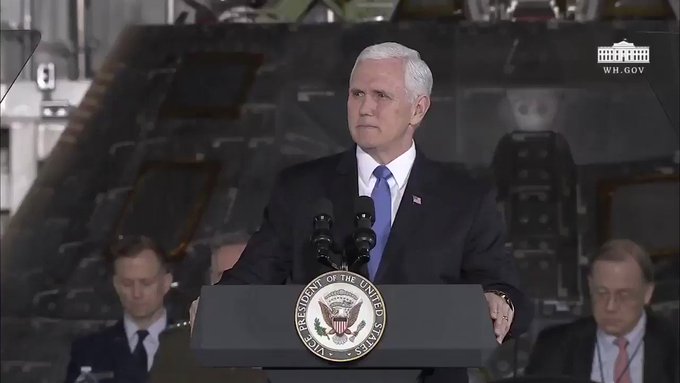U.S. supports era of private spaceflight News
U.S. supports era of private spaceflight
Elon Musk’s aerospace startup, SpaceX, recently enjoyed big news coverage of its launch of the world’s most powerful rocket, but it won’t be the only innovative space firm to make news. Plenty of U.S.-based private companies are getting in on the space race, and the Trump administration aims to help them win.
“Thousands of companies across the country today are working on America’s deep space exploration systems,” Vice President Pence said at a February 21 meeting of the National Space Council. In every one of America’s 50 states, Pence said, “there are hardworking men and women who get up every day to help build the world’s most advanced rockets, satellites and spaceships.”
For example, while SpaceX successfully sends satellites and cargo into orbit, reusing its booster rockets, Amazon.com head Jeff Bezos is testing reusable rockets that he expects will carry humans. And Eren Ozmen of Sierra Nevada Corporation plans to offer developing countries flights to space with a spacecraft called Dream Chaser.
While some U.S.-based companies ready for space tourism, others are manufacturing aircraft capable of launching satellites while aloft. Private firms are sending satellites — some no bigger than shoeboxes — to help communities harmed by natural disasters to communicate with the rest of the world. American businesses are regularly sending experiments to the International Space Station.
In addition to all of that private-sector activity, private contracting partners with the military are helping to strengthen national security capabilities in space.
Support from the government
The newly reconstituted National Space Council announced it will transform the licensing process for space launches to spark innovation.

“Today’s launch-licensing regime is plagued by burdensome government barriers,” said Pence. “The government has figured out how to honor driver’s licenses across state lines. There’s no reason we can’t do the same for rockets.”
Pence recommended that two government agencies, the Department of Transportation and the Department of Commerce, streamline regulations to further support growth in the private space industry.
“We need a future-oriented space commerce agenda and a supportive regulatory regime,” Secretary of Commerce Wilbur Ross said, pledging to be the “one-stop shop” the industry needs to thrive.
Future growth
A 2017 report from Bank of America Merrill Lynch predicts the commercial space industry will grow to eight times its current size over the next three decades. The report estimates a market at $2.7 trillion in 2045, as private companies make spaceflight even more accessible. “We are entering an exciting era in space where we expect more advances in the next few decades than throughout human history,” the report states.
According to Bhavya Lal of the Science and Technology Policy Institute, a U.S.-funded research and development center, the U.S. is the top space power today. By fostering industry, the U.S. will continue to lead, Lal said. She believes that the U.S. has a core competitive advantage: “an innovation ecosystem that rewards creativity, entrepreneurship and risk-taking.”



Post a Comment